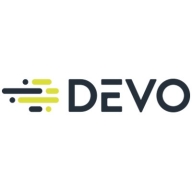

Devo and Cribl compete in the data analytics and log management category. Devo seems to have the upper hand due to its strong focus on visual analytics and high-speed search capabilities, while Cribl is recognized for its expertise in log processing and routing.
Features: Devo offers advanced features like Activeboards that facilitate complex queries and visualizations, a multi-tenant environment to enhance data compliance, and streamlined visual analytics. It is praised for its real-time analytics and user-friendly interface. Cribl excels in real-time data transformation, simplifies log collection, and provides robust data routing options. It also offers features like Cribl Stream, enhancing the flexibility in handling data.
Room for Improvement: Devo could improve its browser-based data handling and customization options for Activeboards visuals. It also needs enhanced support for third-party connectors. Cribl could benefit from better compatibility with legacy systems, enriched logging and debugging features, and improved integration with enterprise solutions.
Ease of Deployment and Customer Service: Devo is known for its cloud-based solutions, delivering varied customer service experiences from exceptional to occasionally delayed. Cribl, primarily an on-premises product, offers professional services but faces criticism for its slow tech support and complex versioning system. Both companies can improve their documentation and technical support.
Pricing and ROI: Devo adopts an ingestion-based pricing model with additional costs for metadata, offering competitive pricing with long data retention of 400 days. Users mention cost concerns related to unexpected metadata charges. Cribl is priced lower than some competitors like Splunk and emphasizes cost savings for large data volumes, making it advantageous in ROI assessments.
What we've seen is really an overall reduction of just shy of 40% in our ingest into our SIM platform versus prior to having Cribl.
In terms of reduction, we were able to save almost ~40% of our total cost.
In the case of optimization, it has helped return on investment to somewhere close to 50%.
They had extensive expertise with the product and were able to facilitate everything we needed.
Usually, within an hour, we get a response, and we are able to work with them back and forth until we resolve the issues.
If they could enhance their internal logging, we won't require Cribl support to engage.
The infrastructure behind Cribl Search is also scalable as it uses a CPU and just spawns horizontally more instances as it demands and requires.
It's an enterprise version, and we have a good amount of users using this solution.
I don't need to talk to a Cribl engineer to connect a new log source.
Migrating from those SC4S servers to Cribl worker nodes has truly been a game-changer.
I would rate the stability as ten out of ten.
If the pipeline is down and we receive an alert that it's not sending information to the log collection platform for more than one or two hours, if we receive an alert, it would be great.
If we can have more internal logs and more debug logs to validate the error, that would be beneficial because instead of reaching out to Cribl support, we can troubleshoot and find the root cause ourselves.
In terms of large datasets—whether they originated from network inputs, virtual machines, or cloud instances—ingesting the data into the destination was relatively easy.
Since Cribl is such a large platform with numerous features, having a clear, structured approach would make it easier for me and others to understand and utilize its capabilities.
This is particularly evident when dealing with failed login attempts and determining true versus false positives.
Over time, the licensing cost has increased.
Cribl is very inexpensive, with enterprise pricing around 30 cents per GB, which is really decent.
They have a universal license that allows us to consume the portions of Cribl that we want to use or flex into other portions of Cribl.
The data reduction and preprocessing capabilities make Cribl really unique.
Cribl has a feature called JSON Unroll or Unroll function that allows you to differentiate the events; each event will come ingested as a single log instead of piling it up with multiple events.
The Cribl UI is very simple and easy to use, particularly when working with data from various sources; it makes it very easy to create pipelines, add complex logic to those pipelines, and then gives you a preview of what your data looks like before applying that pipeline and what you get after.
When they see a spike in a line chart for a failed login, which could be a true or false attempt, they can click that spike, and a table widget on the same active board instantly populates with raw logs of data for those specific failed logins.
| Product | Market Share (%) |
|---|---|
| Cribl | 2.5% |
| Devo | 0.7% |
| Other | 96.8% |


| Company Size | Count |
|---|---|
| Small Business | 9 |
| Midsize Enterprise | 5 |
| Large Enterprise | 15 |
| Company Size | Count |
|---|---|
| Small Business | 8 |
| Midsize Enterprise | 4 |
| Large Enterprise | 11 |
Cribl offers advanced data transformation and routing with features such as data reduction, plugin configurations, and log collection within a user-friendly framework supporting various deployments, significantly reducing data volumes and costs.
Cribl is designed to streamline data management, offering real-time data transformation and efficient log management. It supports seamless SIEM migration, enabling organizations to optimize costs associated with platforms like Splunk through data trimming. The capability to handle multiple data destinations and compression eases log control. With flexibility across on-prem, cloud, or hybrid environments, Cribl provides an adaptable interface that facilitates quick data model replication. While it significantly reduces data volumes, enhancing overall efficiency, there are areas for improvement, including compatibility with legacy systems and integration with enterprise products. Organizations can enhance their operational capabilities through certification opportunities and explore added functionalities tailored towards specific industry needs.
What are Cribl's most important features?Cribl sees extensive use in industries prioritizing efficient data management and cost optimization. Organizations leverage its capabilities to connect between different data sources, including cloud environments, improving both data handling and storage efficiency. Its customization options appeal to firms needing specific industry compliance and operational enhancements.
Devo is the only cloud-native logging and security analytics platform that releases the full potential of all your data to empower bold, confident action when it matters most. Only the Devo platform delivers the powerful combination of real-time visibility, high-performance analytics, scalability, multitenancy, and low TCO crucial for monitoring and securing business operations as enterprises accelerate their shift to the cloud.
We monitor all Log Management reviews to prevent fraudulent reviews and keep review quality high. We do not post reviews by company employees or direct competitors. We validate each review for authenticity via cross-reference with LinkedIn, and personal follow-up with the reviewer when necessary.